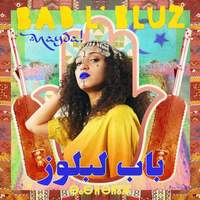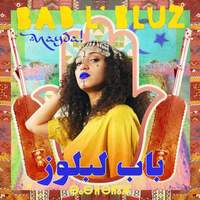Recording of the Week,
Bab L' Bluz - Nayda!
 In an alternate universe I would now be packing my rucksack in preparation to attend the WOMAD music world festival this weekend, but seeing as live music has been cancelled for 2020 I’ve been consoling myself with Nayda!, the debut album by the Moroccan-French band Bab L’ Bluz. A four-piece formed by Moroccan-African singer and guembri player and singer Yousra Mansour and French musician Brice Bottin in 2018, the group cook up a heady brew mixing traditional Moroccan gnawa music, the story-telling of griot poets with blues and rock energy. Following in the footsteps of artists like Rachid Taha and Nass El Ghiwane, there’s a contemporary edge to Bab L’ Bluz’s approach that sees satisfyingly fat beats and chunky bass lines intertwining with some truly psychedelic arrangements, making this impossible to not want to dance to.
In an alternate universe I would now be packing my rucksack in preparation to attend the WOMAD music world festival this weekend, but seeing as live music has been cancelled for 2020 I’ve been consoling myself with Nayda!, the debut album by the Moroccan-French band Bab L’ Bluz. A four-piece formed by Moroccan-African singer and guembri player and singer Yousra Mansour and French musician Brice Bottin in 2018, the group cook up a heady brew mixing traditional Moroccan gnawa music, the story-telling of griot poets with blues and rock energy. Following in the footsteps of artists like Rachid Taha and Nass El Ghiwane, there’s a contemporary edge to Bab L’ Bluz’s approach that sees satisfyingly fat beats and chunky bass lines intertwining with some truly psychedelic arrangements, making this impossible to not want to dance to.
It’s all too easy to let musics outside of mainstream Western culture, sung in foreign languages, wash over us, as we focus on the exotic scales and rhythms, which was the case when I first heard Nayda!. However it’s worth spending a moment considering the cultural background that informs the genesis of the album. The ‘nayda’ of the title namechecks the movement that arose in Morocco during the Arab Spring of 2010-2012, when the youth took to the streets to peacefully protest against the deeply conservative attitudes towards freedom of speech, especially for women, under the rule of King Mohammed VI. Ensuing elections following the protests, initially regarded as progressive, ultimately reinforced the status quo, and if anything resulted in a deeper entrenchment of the old values; the net effect of which was a large rise in emigration amongst the younger generations. The spirit of the movement was no flash in the pan, however, and ten years of the nayda movement is alive and thriving, as the younth continue to reclaim the rich Moroccan musical and poetic heritage for themselves. The fact that Yousara Mansour is a woman playing the ‘guembri’, a three-stringed instrument hitherto almost exclusively the preserve of men within gnawa ceremonies, is a bold statement itself, and one for which she has received no little criticism in her homeland. That she injects such energy and inspiration into the instrument (although for most of the record she plays a smaller version of the 'guembri', the 'awisha'), electrifying and distorting the sounds so it can hold its own alongside the guitar, makes it all the more remarkable.
The opening track ‘Gnawa Beats’ has a groove that recalls the swagger of prime baggy-era Stone Roses, the lyric, which translates to ‘Welcome to the truth that can be told’, setting the tone of defiance that informs the whole album. The lead single ‘Il Mata’ follows, a slower, more psychedelic track, with lyrics inspired by the Tunisian poet Anis Shoshan. Mansour has said they ‘aim to awaken the sleeping consciousness of individuals indoctrinated by racist statements and who consider some humans superior to others. It is a call to search for what can unite us instead of going towards everything that divides us.’ There is frequently a nice dynamic set-up when Mansour’s more ethereal vocals are punctuated by the machismo of the occasional ‘Hey!’ from the men, playing with the shifting sexual politics that the band represents.
Throughout, the production is teeming with detail; flutes, loops of native instruments such as the ribab, and apparently even a recording of the waves hitting the shore of Port Essaouira. Hafid Zouaoui’s drumming combines the acoustic kit and digital samples to great effect, with Jérome Bartholomé adding all manner of percussive details, as well as flutes, and the distinctive clank of the karhab (sort of iron castanets), and vocals. The results always feel like a band playing live though, never coming across as a studio concoction, no doubt thanks in part to the arrangements of Brice Bottin. All ten tracks stand out on their own terms but the flow of the sequencing makes ‘Nayda!’ succeed as a unified statement. I could happily pick any of the tracks as a sample, but ‘Waydelel’, featuring renowned ribab player Aziz Ozouss, perhaps best encapsulates the ebullience on offer… just wait for that cowbell to kick in.




